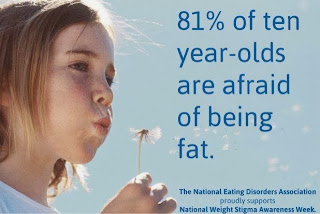This is long over due! The criteria for diagnosing anorexia has finally been broadened to include any weight - instead of the precious under weight "symptom". This help clear up the misconception that anorexia is a weight disease instead of purely a psychological one. With Weight Stigma Awareness Week in full swing I'd say this is a great time for the news!
More than 55% of teen girls and more than 30% of teen boys report some kind of “disordered eating”. This means they exhibit symptoms like purging by way of self-induced vomiting, laxative and/or diuretic abuse, excessive exercising, restricting food consumption, binging, using diet pills, and even diabetics using insulin to regulate and manipulate their weight.
“Before, patients were very sick before meeting criteria, and the evidence is pretty clear that if you interfere in anorexia before there’s been significant weight loss, the outcomes are much better and the illness is easier to treat in an outpatient setting,” says Kimberli McCallum, founder and medical director of eating disorder clinic McCallum Place in Saint Louis, in an article by Tara Haelle with Scientific America[1].
Before, many people fell into the EDNOS category[2]. EDNOS is the diagnosis given to any person exhibiting disordered eating but didn't fit exclusively into either the anorexia or bulimia category.
So what was the problem with EDNOS? Usually the EDNOS diagnosis was not taken seriously by insurers, family members, or even physicians. This tremendously complicates treatment for an extremely deadly disorder. In fact, it's the most deadly eating disorder.
Aside from the change to the DSM-5 criteria regarding a weight requirement are other changes. Instead of the previous psychological markers of “intense fear of gaining weight or becoming fat,” it now reads “or persistent behavior that interferes with weight gain, even though at a significantly low weight.” And the criterion "at least three missed periods" has been completely removed. It has also added that while using BMI to help establish severity, “the level of severity may be increased to reflect clinical symptoms, the degree of functional disability and the need for supervision.” Additions of “partial remission” or “full remission” have also been added to prevent recovering anorexics from being rebranded with EDNOS. I know that, for myself, there have been several partial remissions. These remissions I experienced always had some other element that wasn't there the first time around. I suspect it's the same for many others.
The real challenge is going to be physicians and families seeing an over weight child/adolescence lose weight and actually investigating the weight loss methods instead of just congratulating them. Being complimented and praised is so addictive, not only to children and adolescents, but to anybody. The truth is that there can be serious health complications going on such as dehydration, digestive issues, cardiac issues, kidney and liver issues, and difficulty concentrating.
These changes will hopefully help health insurance claims as well. Many insurance companies automatically refused any patients for overnight treatment if they were more than 85% of their ideal weight.
This should also help obtaining more reliable research statistics as well. Yay!
This is a win, guys!!!
[1] http://www.scientificamerican.com/article.cfm?id=expanded-clinical-definition-of-anorexia-may-help-more-teens&WT.mc_id=SA_sharetool_Twitter
[2] http://www.something-fishy.org/whatarethey/ednos.php





